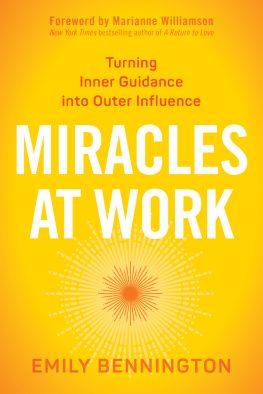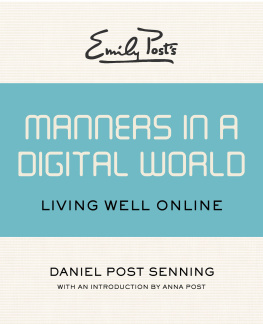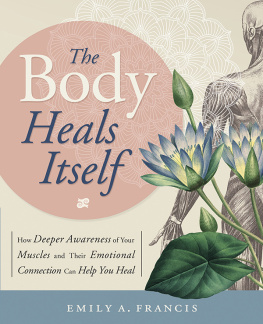
To Helen Schucman and William Thetford for bringing
A Course in Miracles into the world.
And to my grandmother, Mary Lou Bennington,
who didnt need it to embody unconditional love.
There is a light in you the world can not perceive.
And with its eyes you will not see this light,
for you are blinded by the world.
Yet you have eyes to see it.
A COURSE IN MIRACLES (W-PI.189.1:13)
CONTENTS
Foreword
BY MARIANNE WILLIAMSON
K nowledge is power. And there is no greater power than spiritual insight because it is the deepest knowledge of all. It is the understanding of who we are and how we operate, how we fit into the universe, and where our true power lies.
In Miracles at Work, Emily Bennington applies her understanding of one of the greatest spiritual teachings of our time or of any time, A Course in Miracles, to an area of great importance and at times great anxiety for millions of people. The idea of taking the bull by the horns has turned out to be a questionable prescription for professional success; while it sometimes promotes success and sometimes does not, it also causes frequent suffering to us and to those around us. High stress, anxiety, lack of peace of mind, and broken relationships frequently litter our career paths as we struggle day in and day out to handle the normal complications of professional life. Something is desperately wrong when there are so many headaches and heartaches among those who are struggling to make it in the world.
Yet is there an alternative? Its not enough to simply detach from a dysfunctional worldview; our need is to embrace a better one. A Course in Miracles is a better one, and Bennington teaches it beautifully. She guides us beyond the entrenched paradigm that dominates our current thinking about career, beginning, to quote A Course in Miracles, by considering the possibility that there might be a better way. We can switch our mental filter from one that promotes an endless cascade of anxiety to one that promotes inner peace.
Only when the psyche is transformed from an instrument of chaos to an instrument of love are our circumstances transformed from pain to peace. Our work lives can change only when we change.
The spiritual journey is a path of the heart, an internal process with external effects. Fundamental spiritual changesfrom thoughts of blame to thoughts of blessing, and thoughts of condemnation to thoughts of forgivenessaffect every area of our lives because they change us. They lift us above the harsh and anxious energies that block our good by blocking our relationships and undermining our skills. As Bennington writes, Love cannot transform your career until it transforms you first.
Mainstream understanding of spirituality has changed over the last few decades. It is no longer seen as a category separate from the rest of our existence, but rather a template for right living that underlies them all. Love is no longer seen as just some soft, gooey thing to be relegated to only some aspects of life, but rather the meaning and essence of life itself. The path of the heart is relevant to everything.
Learning the practical application of that principle, however, is not always easyespecially in the workplace. Many would question what it actually means to bring love into the conference room. Thus the importance of this book.
Using the principles of A Course in Miracles to guide the reader through everyday work situations any modern professional can relate to, Bennington articulates a path out of hell for the harried, stressed-out employer or employee. As we switch from primary identification with our worldly roles to identification with our spiritual function as practitioners of love and forgiveness, we dont find ourselves less effective at work; rather, the opposite. We find ourselves calmer, more peaceful, and more appreciated by others. Spirituality is not a life of sacrifice; it is a life of greater power both within and without.
Bennington is not nave about the modern work world. As someone who has counseled numerous executives and has written bestselling books on career success, she knows whereof she speaks about worldly as well as spiritual matters. She knows that bringing the two into right alignment is a recipe for success both personally and professionally, and by writing this book she has done a great service for anyone seeking a more peaceful, more successful life. In Benningtons words, Spiritual intelligence becomes far more than just a tool for professional growth: it becomes a fundamental change in your entire worldview.
This book, then, will not only offer you guidance for the workplace; it will offer you guidance for your entire life. As you read it, you will begin to repair the thought that there was ever a separation between the two. It is sometimes very hard to find the love when trying to make deadlines, work the numbers, and pay the bills. But Bennington makes the important point that the only way to find the love is to be the love, wherever we are and whatever were doing.
Such is the miracle. Such is the work. Such is this book.
Introduction
IS BUSINESS SPIRITUAL?
O kay, everyone, put down your Starbucks and close your eyes.
The conference director appeared nervous and slightly overwhelmed as he stood at the podium and looked into the crowd of CEOs, educators, and entrepreneurs who had gathered in Washington, DC, for a mindful leadership summit.
Actually, he seemed rather surprised wed shown up.
Could a group of hyper-ambitious, logic-driven executives really be interested in a twenty-six-hundred-year-old contemplative practice?
And yet, there we were.
More than five hundred strong, all jammed into a gallery space so tight that people were lucky even to stand in the back. (Unlucky ones had to watch via streaming video next door.)
TIIIIIIIIIIIIINNNNNNNNGGGGG...
The opening chime echoed loudly around the room as the roar of hundreds of conversations occurring all at once began to settle and then... silence.
This was not our first rodeo.
Thank you, said the director. Now, for just a moment Id like you to think about what brought you here. Id like you to think about what you hope to achie
He didnt have to finish the sentence.
I already knew.
In fact, I had come to DC for the sole purpose of asking a question that had been tormenting me ever since my career-coaching business began to attract clients whose challenges went far beyond work.
Betrayal.
Addiction.
Cancer diagnosis.
Loss of a child.
Resurfacing childhood trauma.
Believe me, I could go on.
As each story became more complex, there was something I deeply wanted to share with these clients and yet I always held back. Eventually, the idea of not sharing it would start to bother me again and the whole cycle would begin anew.
By attending the summit, I had come to consult my tribe. After all, these were executives with meditation rooms next to boardrooms. The ones who wear mala beads with business suits and vacation at ashrams. If anyone would understand my struggle, surely I was looking at them.
This is how I found myself holding a microphone in front of the entire audience and a panel of gurus, finally asking the question that had been spinning in my head for almost two years:
If mindfulness is a spiritual practice at its roots, then what role does spirituality play in business and leadership?
There was a loud sigh from somewhere in the crowd behind me and a moment of awkward silence when members of the panel looked at each other as if to say,
Next page









